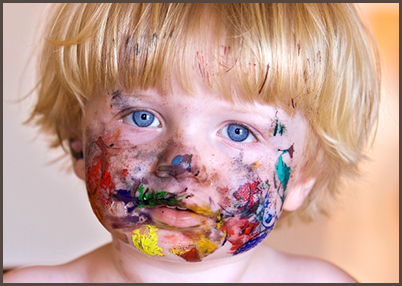
Children of divorce can be disruptive, and many times, the adult standing in front of them doesn’t know what to do. Here are two really easy techniques to use.
Tip #1
Don’t ask the child any question whose answer you already know. It tends to take away the dignity of the child. More than likely, the child knows you know the answer, so he’ll wonder why you asked the question in the first place.
For example, don’t walk over to a messy art table and ask, “Did you do this?,” if you know that the child did. Many times, you’ll be setting the child up to lie, or the child might get out of control protesting that he didn’t make a mess.
Instead, simply state the facts, and describe what you see:
“Wow, what a mess. There’s paint on the floor.”
Then continue on with the Safekeeper talk or a conversation about being helpful:
“Paint on the floor isn’t safe for others. What could you do that would be safe?”
Or,
“Someone might fall with this slippery paint on the floor. What could you do that would be helpful?”
Tips #2
Don’t praise children of divorce for simply doing what they should. Whenever they do cooperate or even make a move to join in, then comment noting what they did.
Instead of praising children of divorce, describe what they have done.
“Johnny, you walked across the room and sat down to work on the activity.”
You could add, “That was helpful.”
In other words,
- Don’t praise children for doing what they are supposed to do.
- Simply notice their actions.
- Describe what they did.
Many children with disruptive behaviors don’t feel worthy of praise and will set out to prove you wrong. The more you praise them, the more out of control they will try to be. Also remember, if the children think that the divorce is their fault, they may feel that they don’t deserve any praise.
The children might feel worthy only of condemnation. Praise can come later when they have realized that divorce is an adult problem. Praise can also come when the children feel like they have earned praise it.
Keep remembering that these are hurting children. Most are begging for attention and will get it any way they can
Many times, they have been kicked out of different situations and are sure that, if they act badly enough, you’ll also tell them to leave. After all, they think that they are so bad that one of their parents couldn’t stand it and left.
More than once, I have said to a child of divorce,
“You can believe that I care so much for you that you are here to stay. The more out of control you are, the more your body is telling me you want my help. And because I respect you, I will oblige!”
Sometimes just understanding the reasons children of divorce might be disruptive will help you lovingly disciple and discipline them. The reasons a child might be disruptive are the same reasons a child will bring chaos to your group.
Hang in there! Don’t despair. Work with these children. Allow God to work with you and through you. Use God’s dress code found in Colossians 3:12 and 14:
“Clothe yourselves with compassion, kindness, gentleness, and patience. . . . And over all these virtues, put on love, which binds them all together in perfect unity.”
DC4K blogs posts are great to use for training children’s leaders and volunteers and they are free. Subscribe to the DC4K blog here.
Want to learn more about how to start a DivorceCare for Kids group for the hurting children in your community? Click here.
Did you know DC4K blog articles are on Pinterest? Divorce & Kids, Children’s Pastors, Single Parents, etc. It’s all there. Check it out here
Follow Linda on Twitter, dc4klinda









